BETTER LATE THAN CRAP: Movie Reviews of The Innocents, Wiener-Dog and Hunt for the Wilderpeople by Howard Casner
Posted: July 30, 2016 | Author: Donald | Filed under: Uncategorized | Tags: Absolutely Fabulous: the Movie, Agatha Kulesza, Alice Vial, Anne Fontaine, Au hazard Balthazar, Danny Devito, Eagle vs. Shark, Ellen Burstyn, Greta Gerwig, Housebound, Hunt for the Wilderpeople, Ida, Julian, Julie Delpy, Keaton Nigel Green, Kieran Culkin, of Flight of the Concords, Pascal Bonitzer, Pawel Pawlikowski, Rachel House, Rima Te Waititi, Sabrina B Marine, Sam Neill, Star Trek Beyond, Taikia Waititi, The Innocents, Tracy Letts, Weiner-Dog, What We Do in the Darkness, Zosia Mamet | 3 Comments »First, a word from our sponsors: I am now offering a new service: so much emphasis has been given lately to the importance of the opening of your screenplay, I now offer coverage for the first twenty pages at the cost of $20.00. For those who don’t want to have full coverage on their screenplay at this time, but want to know how well their script is working with the opening pages, this is perfect for you. I’ll help you not lose the reader on page one.
Ever wonder what a reader for a contest or agency thinks when he reads your screenplay? Check out my new e-book published on Amazon: Rantings and Ravings of a Screenplay Reader, including my series of essays, What I Learned Reading for Contests This Year, and my film reviews of 2013. Only $2.99. http://ow.ly/xN31r
and check out my Script Consultation Services: http://ow.ly/HPxKE
Warning: SPOILERS
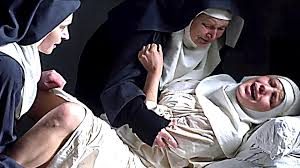 I know I’m a little late with reviews of the above titled films. I got behind in work and I wasn’t sure when I was ever going to get back to blogging and even thought of bypassing these movies since some of them have passed from the theaters.
I know I’m a little late with reviews of the above titled films. I got behind in work and I wasn’t sure when I was ever going to get back to blogging and even thought of bypassing these movies since some of them have passed from the theaters.
But last week two major tentpole type films opened the same weekend, Absolutely Fabulous: the Movie and Star Trek Beyond, and both are crap. No, they are worse than that. They are crappity crap crap crap.
So I thought I owed it to the other movies to share my views. I mean, how can I justify passing up these three movies when I’m going to eventually review crap?
So, let’s begin.
In the early sixties Poland had, what was termed in the biz, a new wave, a group of emerging filmmakers who had something unique and fresh to say (or at least tried, the country was still a Russian satellite at the time). Directors and writers like Roman Polanski, Andrzej Wajda, Krzysztof Zanussi and Krzysztof Kieslowski burst on the scene with an exciting outpouring of new work like Knife in the Water, Ashes and Diamonds, The Contract and Camera Buff.
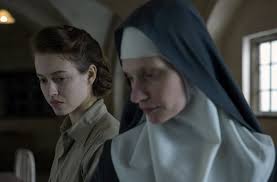 Today, Polanski, Wajda and Zanussi are still making movies (though Polanski seemed to lose something after his self-exile from the U.S. due to his statutory rape arrest). Kieslowski, perhaps Poland’s greatest filmmaker, has, unfortunately, passed.
Today, Polanski, Wajda and Zanussi are still making movies (though Polanski seemed to lose something after his self-exile from the U.S. due to his statutory rape arrest). Kieslowski, perhaps Poland’s greatest filmmaker, has, unfortunately, passed.
But there are signs that a new generation of filmmakers are beginning to make themselves known.
In 2016, we had Ida (which won the Oscar for best foreign language film), directed by Pawel Pawlikowski, a story about a novitiate who leaves her convent to take care of some family business. Interacting with her Communist Party Aunt, a judge and an atheist, she must decide whether to return to her vocation or not. It was a deeply moving picture with a powerful performance by Agatha Kulesza as the Aunt.
And now we have The Innocents, written by director Anne Fontaine, Pascal Bonitzer, Sabrina B Marine, and Alice Vial, which is also a story about members of a nunnery and again with Kulesza, this time as the Mother Superior.
Based on a true event, the basic premise revolves around a doctor working in post-World War II Poland for the French Red Cross. Russia has taken control and the country has been more than decimated.
The doctor has been asked by a nun to come to her convent. The doctor was chosen because she is neither Polish nor Russian, which turns out to be an important qualification. When she arrives, she discovers she has been called because a sister is about to give birth; even more difficult is that it is a breach birth.
The doctor saves both the sister and her child. But it turns out that perhaps nine nuns are pregnant. When the Russians came through, they visited the convent several times, raping the occupants time and time again. The nuns are afraid of what the Russians will do if they find out and they fear the Polish authorities will cause a scandal and close the convent.
So the doctor must keep it a secret.
Like Ida, The Innocents is a powerful and effective drama with a strong and often emotionally compelling story. Like Ida, it shows sympathy for those who are on a spiritual search, something that Communist Russia tried to wipe out, but seemed to only make stronger (Wajda, Zanussi and Kieslowski all dealt with religious ideas in their films). Like Ida, it focuses on woman who choose to make their own decisions in an often cruel, male dominated society.
Highly recommended.
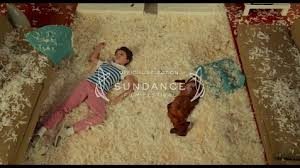 Todd Solondz’s early films tended toward nihilistic misanthropy. The characters, whether victim or prey, were awful examples of humanity who treated each other with a sociopathology worthy of Hannibal Lector. (“We’re not laughing at you, we’re laughing with you”, “ But I’m not laughing” is one of my favorite moments.)
Todd Solondz’s early films tended toward nihilistic misanthropy. The characters, whether victim or prey, were awful examples of humanity who treated each other with a sociopathology worthy of Hannibal Lector. (“We’re not laughing at you, we’re laughing with you”, “ But I’m not laughing” is one of my favorite moments.)
The difficulty with his films is there was something hypocritical about his approach. He was calling out people for treating their fellow man with exactly the same cruelty, vileness and lack of empathy with which he, himself, treated the characters.
But in his latest films, and now in his new one, Weiner-Dog, he’s begun to mellow a touch. His characters still tend to treat each other with meanness, but at the same time, the characters and Solondz often show unexpected humanity toward each other.
In Roberto Rossellini’s Au hazard Balthazar, a cruelly treated donkey, passed from character to character, is seen as a metaphor for Christ. In Solondz’s newest file, the same structure is basically used as a dachshund travels from owner to owner.
Weiner-Dog is basically a portmanteau movie, a series of short films connected in some way. This has been a popular sub-genre of cinema from the days of early Hollywood. Intolerance, D.W. Griffith’s answer to the accusations of racism in The Birth of a Nation, intercut four stories of man’s inhumanity to man. This continued with such fare as If I Had a Million (about a variety of people arbitrarily chosen by a wealthy man to receive a million dollars—the Charles Laughton vignette is sublime).
However, the most satisfying example of this genre is probably Dead of Night, in which a group of people gather socially and end up telling scary stories, with the standout the famous Michael Redgrave ventriloquist dummy episode.
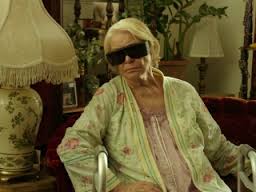 Weiner-Dog is better than many if not most in this genre. The first episode is the weakest in which a family (Tracy Letts, Julie Delpy, Keaton Nigel Green) is incredibly, and I’m not sure all that believably given the context, mean to each other as they adopt a dog because their child recently recovered from cancer. The sad ending leads to Weiner-Dog being saved from the oven by Greta Gerwig who ends up taking him with her on a road trip with Kieran Culkin that takes an unexpected turn both in plot and emotional depth in which people actually treat each other much nicer than one usually finds in a Solondz film.
Weiner-Dog is better than many if not most in this genre. The first episode is the weakest in which a family (Tracy Letts, Julie Delpy, Keaton Nigel Green) is incredibly, and I’m not sure all that believably given the context, mean to each other as they adopt a dog because their child recently recovered from cancer. The sad ending leads to Weiner-Dog being saved from the oven by Greta Gerwig who ends up taking him with her on a road trip with Kieran Culkin that takes an unexpected turn both in plot and emotional depth in which people actually treat each other much nicer than one usually finds in a Solondz film.
At this point, Solondz drops any pretension of logically passing the dog from owner to another. The pooch next ends up as a sort of therapy and excuse for exercise for a widowed and frustrated screenwriter Danny Devito who has turned his one successful film into a teaching gig at a film school. There he’s barely hanging on and receives little respect from the students (none of whom seem to have even one-tenth of his talent, even though he’s presented as a hack). Devito earns a lot of empathy in his portrayal, though the resolution of the story doesn’t really gel.
But the final episode actually achieves a sort of transcendence with Ellen Burstyn as a woman who is coming to terms with her mortality and Zosia Mamet as her granddaughter who comes buy for an unexpected visit. It’s a powerful look at the futility of life with a resolution that says everything there is to say about being alive, with an ending that is both horrifying, yet ultimately funny and moving.
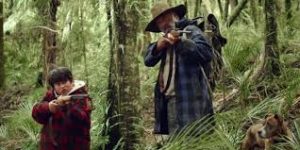 New Zealand has seen something of a new wave itself with such films as What We Do in the Darkness, Housebound and Eagle vs. Shark (not surprising, perhaps, since they also gave us the sublime The Lord of the Rings-let’s just forget about The Hobbit, shall we?).
New Zealand has seen something of a new wave itself with such films as What We Do in the Darkness, Housebound and Eagle vs. Shark (not surprising, perhaps, since they also gave us the sublime The Lord of the Rings-let’s just forget about The Hobbit, shall we?).
Now we have Hunt for the Wilderpeople, written and directed by Taikia Waititi (he also appears as the minister here, a very funny cameo). He also directed and has written or co-written …Darkness, Eagle vs. Shark, as well as episodes of Flight of the Concords and The Inbetweeners.
In …Wilderpeople, a young boy, Ricky, whose crimes include stealing, fighting, graffitying and spitting (which seems to be a particularly heinous crime in NZ), has reached the end of the authorities’ rope and as a last chance before juvenile detention, is sent to live in the country with a childless couple. The couple is unconcerned about his running off both because there is no place to run, and because he’s so heavyset, he can still see the house before he has to rest for the night.
Waititi has a lot of fun making slight fun of his characters, who both feel real, yet exaggerated at the same time (especially scene-stealing Rachel House as Paula, who brings Rickey to his new home and who seems to have a mild delusion of grandeur issue at times-there’s just something about the way she says Ricky Baker with those clipped intonations that just about says it all), but he also brings a lot of empathy to them as well.
Rima Te Waititi (the mother in Housebound) plays Bella, Ricky’s foster mother, with an unrelenting cheerfulness that at first makes you want to run along with Ricky, but her deep love of life and selflessness soon win you over. Sam Neill plays Bella’s husband Hec with a Mr. Wilson gruffness that doesn’t really fool anyone.
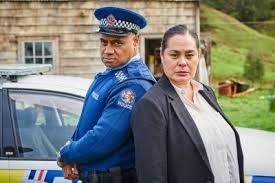 All give excellent performances, especially Neill who gets better the farther he gets from playing characters known mainly for their looks. He gives a performance as relaxed as the extra weight around his waist. He and Julian Dennison as Rickey work well together, even though there is something familiar about their relationship (I mean, if you don’t know how their arcs are going to develop, you need to get out to the movies more).
All give excellent performances, especially Neill who gets better the farther he gets from playing characters known mainly for their looks. He gives a performance as relaxed as the extra weight around his waist. He and Julian Dennison as Rickey work well together, even though there is something familiar about their relationship (I mean, if you don’t know how their arcs are going to develop, you need to get out to the movies more).
The story takes a surprising and moving turn at the end of act one. Unfortunately, everyone has trouble keeping the story involving as all involved have trouble making the second act interesting. And it all ends on an upbeat feel good finale that is satisfying enough, but is a bit too formulaic to be little more than that.












… [Trackback]
[…] Information to that Topic: rumblespoon.com/wp/2016/better-late-than-crap-movie-reviews-of-the-innocents-wiener-dog-and-hunt-for-the-wilderpeople-by-howard-casner/ […]
… [Trackback]
[…] Find More on to that Topic: rumblespoon.com/wp/2016/better-late-than-crap-movie-reviews-of-the-innocents-wiener-dog-and-hunt-for-the-wilderpeople-by-howard-casner/ […]
… [Trackback]
[…] Here you can find 57860 additional Information to that Topic: rumblespoon.com/wp/2016/better-late-than-crap-movie-reviews-of-the-innocents-wiener-dog-and-hunt-for-the-wilderpeople-by-howard-casner/ […]